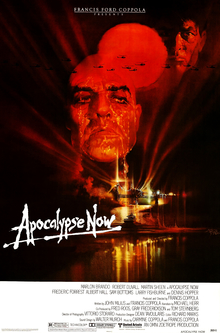I get the reverence of the movie; I even like the bizarre French plantation interlude, but that ending. Oof.
The entire movie was hyping up Colonel Kurtz as a badass Green Beret who finished the brutal training course at the age of thirty something, led his special forces to victories without authorization from chief of staff, is being treated and feared as a god by the locals etc.
When the boat finally reaches the destination, like a normal person, I was thinking shit would go down. Nothing happens. You have Dennis Hopper talking nonsense, Kurtz being philosophical in a dark room and Willard just staring in front of him. When Willard finally comes to his senses, he confronts Kurtz.
I was expecting the confrontation to be more like this:

It turned out like this (yes that is an actual animal getting slaughtered):

What the fuck? Kurtz did nothing back. Did he want to die? Was he startled by the ambush? This man was literally sent to kill you. He knows this since this isn't the first assassination attempt. Martin Sheen's character was monologuing that even the jungle wanted him dead, without any sort of setup by the movie prior. The final line of Kurtz ends up being: The horror... the horror...
I get that Marlon Brando was overweight at the time of filming, which is why they shot the scenes in a poorly lit room, and that the writers had to cobble up a different ending than what was in the original script (which to my knowledge has never been disclosed), but man, what a poorly written ending. Should have casted someone else as Kurtz tbh.
Even the original marketing made him look like a totally unhinged person.

The entire movie was hyping up Colonel Kurtz as a badass Green Beret who finished the brutal training course at the age of thirty something, led his special forces to victories without authorization from chief of staff, is being treated and feared as a god by the locals etc.
When the boat finally reaches the destination, like a normal person, I was thinking shit would go down. Nothing happens. You have Dennis Hopper talking nonsense, Kurtz being philosophical in a dark room and Willard just staring in front of him. When Willard finally comes to his senses, he confronts Kurtz.
I was expecting the confrontation to be more like this:

It turned out like this (yes that is an actual animal getting slaughtered):

What the fuck? Kurtz did nothing back. Did he want to die? Was he startled by the ambush? This man was literally sent to kill you. He knows this since this isn't the first assassination attempt. Martin Sheen's character was monologuing that even the jungle wanted him dead, without any sort of setup by the movie prior. The final line of Kurtz ends up being: The horror... the horror...
I get that Marlon Brando was overweight at the time of filming, which is why they shot the scenes in a poorly lit room, and that the writers had to cobble up a different ending than what was in the original script (which to my knowledge has never been disclosed), but man, what a poorly written ending. Should have casted someone else as Kurtz tbh.
Even the original marketing made him look like a totally unhinged person.

Last edited:


